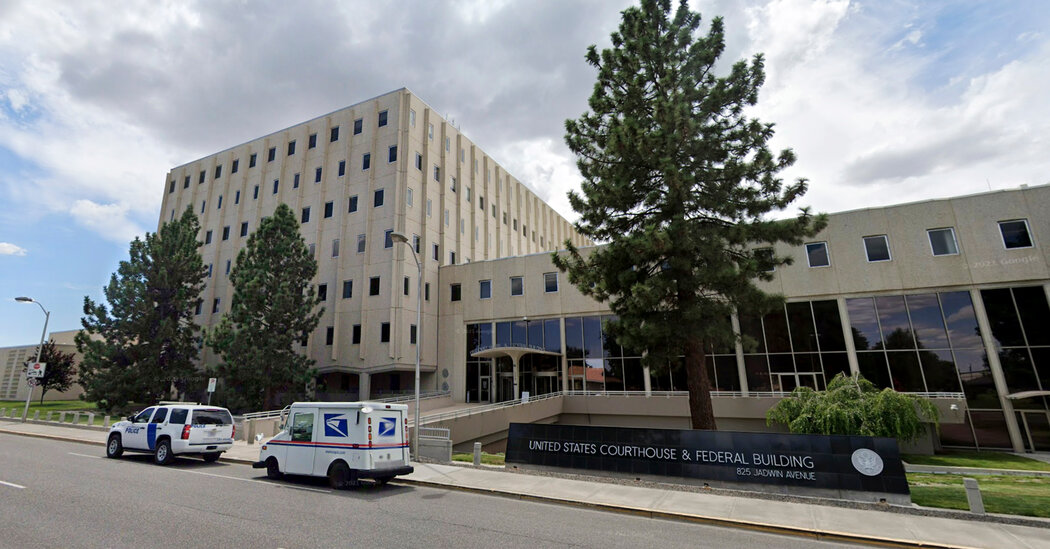The elaborate scheme, which took place from 2017 to 2020 in Washington State, cost insurers $1 million, the authorities said.
The collisions often took place at night on desolate roads, investigators said: that way there would be no witnesses.
But the damage, resulting from more than a dozen car crashes in Washington State over three years and totaling nearly $1 million in false insurance claims, was no accident, according to newly unsealed federal court documents.
Some of the claimants had placed weights on car seats to get the airbags to deploy, even fastening a seatbelt around a case of bottled water, the authorities said. They went so far as to use hammers to smash windows and sought emergency medical treatment for injuries that did not exist, the court documents said.
Twenty-three people have been charged for their roles in staging the collisions from 2017 to 2020 and obstructing the subsequent investigation, federal prosecutors in the Eastern District of Washington announced on Monday as an 81-page indictment was unsealed in the case.
The charges included wire and mail fraud, witness tampering, attempted tampering with evidence, conspiracy to commit health care fraud and attempted obstruction of an official proceeding. The claims were for lost wages, bodily injury and property damage, the authorities said, adding that some of the defendants had fabricated their employment.
According to investigators, the conspirators calculated that they could get more money by totaling the cars and filing an insurance claim than by selling them to a used-car dealership.
“Crash it and get rid of it,” a participant in the yearslong scheme told an associate, as detailed in the court documents.
The associate concurred: “Yes, I total it, I know how to total it. I know what to do to it.”
During an investigation by the Justice Department, the authorities said, four of the defendants fabricated a story about how an F.B.I. agent assigned to the inquiry and an informant had solicited a $22,000 bribe to make the case go away.
The defendants named in the indictment are Ali Abed Yaser, Hussein A. Yasir, Insaf A. Karawi, Hasanein A. Yaser, Ahmad K. Bachay, Mashael A. Bachay, Mohammed Bajay, Hussain K. Bachay, Noor Tahseen Al-Maarej, Ali F. Al-Himrani, Rana J. Kaabawi, Amar F. Abdul-Salam, Ameer R. Mohammed, Mohammed F. Al-Himrani, Maria Elena Sanchez, Seifeddine A. Al-Kinani, Abdullah Al-Dulaimi, Firas S. Hadi, Farooq S. Yaseen, Khalil Abdul-Razaq, Jesus George Sanchez, Sinan Akrawi and Mohammed Naji Al-Jibory.
The defendants live in Washington, California, Nevada, Michigan and British Columbia.
Lawyers listed for 15 of the 23 defendants did not immediately respond to requests for comment on Tuesday, while another three declined to comment. Four of the defendants were still at large. Information about the remaining defendant’s lawyer was not listed in court records.
The U.S. Attorney’s Office for the Eastern District of Washington declined to comment further on the case on Tuesday, including to say how the defendants had been initially connected to one another.
According to the indictment, one of the defendants had discussed bringing a false misconduct complaint against the F.B.I. agent investigating the case. As part of that false narrative, the authorities said, that defendant would claim to the F.B.I. that his family was being threatened by the Mahdi Army, a militia group in Iraq.
In total, the group staged about 14 collisions, the indictment said. In one of them, the authorities said, one of the defendants intentionally drove a Toyota Sienna minivan into an Infiniti FX35, a crossover S.U.V. carrying several other defendants, including the driver, near an intersection in Franklin County in southeastern Washington in January 2019.
The minivan’s driver had boasted to the F.B.I. informant about the fraud scheme, investigators said.
“I did the insurance in the day and I hit it at night,” he said, according to the indictment.
In another collision, involving a Jeep Grand Cherokee and a Chevrolet Traverse in September 2019 in Pasco, Wash., a city in the southeastern part of the state, two of the defendants used hammers to inflict additional damage to the Jeep before the police arrived, the authorities said.
In April 2020, investigators said, one of the defendants rammed a Chevy Malibu three times into a second Chevy Malibu at an intersection in Kennewick, Wash.
The defendants rehearsed what they would say to the authorities if one of the defendants was questioned, court records said.
According to the indictment, the one defendant instructed the other to say “what Americans say here”: “I don’t know.”


























